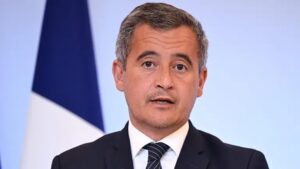Protests, Parades, and Problems
Liberty, equality, fraternity: That’s what France celebrates on its national holiday today. However, there is great fear that the violence of recent weeks could flare up again. Here’s a preview.
Fireworks are currently a double-edged sword in France. Especially on July 14th, it is traditionally the soundtrack to celebrate the pathos-laden ideals of freedom, equality, and brotherhood. However, after the death of 17-year-old Nahel at the end of June, fireworks were thrown at police forces and public buildings for several nights. “Not again,” thought many mayors, and as a precaution, cancelled the “quatorze juillet” celebrations.
Marine Le Pen, the leader of the far-right Rassemblement National, finds this unacceptable. “I am appalled that some municipalities have decided to cancel the July 14th celebrations,” she said. “Just imagine: in our great French democracy, we are giving up our national holiday because of possible outbreaks of violence or because a few individuals may decide to cause trouble?” In reality, this shows “that some municipalities have completely lost trust in the state.”
The French government apparently wants to urgently correct this image. At the end of last week, it banned the sale of fireworks to private individuals. Interior Minister Gerald Darmanin emphasized that no one should cancel events and presented a long list of security measures.
“Overall, 130,000 police officers will be deployed on July 13th and 14th. Specifically, 45,000 of them will be responsible for preventing violence in urban areas each evening,” explained the Interior Minister. “We want to guarantee maximum security so that citizens can enjoy the national holiday without any inconvenience caused by a handful of criminals. We will show toughness against anyone who wants to spoil this day.”
 Interior Minister Gerald Darmanin announced the deployment of tens of thousands of police officers.
Interior Minister Gerald Darmanin announced the deployment of tens of thousands of police officers.
Political pressure from conservatives
“Toughness” and “restoring order” have been the priorities of the French government in connection with the unrest from the very beginning. The political pressure behind this stance does not only come from the far right but particularly from the conservatives Les Republicains.
Last week, their party leadership proposed a series of law-and-order measures. “Even young people must take responsibility for their actions, which is why we want full criminal responsibility from the age of 16,” said party leader Eric Ciotti. “And it should be possible to quickly convict minors who endanger public order, just as it is possible with adults.”
However, Les Republicains do not only limit themselves to security policy demands but increasingly try to explain the fault lines and problems in society based on origin. Bruno Retailleau, the leader of Les Republicains in the Senate, sees a connection between the riots and immigration. “I have spoken to many mayors, and they all say that the problems mainly exist where proper ‘migration ghettos’ have emerged,” said Retailleau. “Of course, most of these people are French – on paper. Unfortunately, we are seeing setbacks for the second and third generation of immigrants. A retreat to ethnic roots.”
Filling the gap alongside Rassemblement National
It is primarily the French conservatives who are currently shifting the public discourse further to the right. They are trying to occupy the political space between the allegedly too lenient government and the Rassemblement National. This is analyzed by political scientist Emilien Houard-Vial at France Culture.
“The Républicains have this desire to break with the status quo; to say, in a way: enough with lukewarm solutions, with technical solutions – especially on issues like immigration,” said Houard-Vial. “And at the same time, they are not the Rassemblement National and want to show that they can do better. On the one hand, the Republicains want to appear credible in terms of content, even when addressing the RN’s electorate. It’s like saying: we have the same ideas – but we are more capable of implementing them.”
Macron does not plan to give a speech on the national holiday
And what about President Emmanuel Macron? He remains true to his known stance of “neither-nor.” Macron commented on the events of the past weeks on Wednesday on the sidelines of the NATO summit in Vilnius. And with audible annoyance, he emphasized again that these events are neither a social nor a security policy problem.
“Is it because the state has not invested enough in the banlieues? – No! We are investing much more than before the start of my first term,” Macron emphasized. “Is it due to a lack of security forces or judicial personnel, as others say? – No! We have created more than 10,000 positions.” The issues are more complex. “We will work systematically to find the best possible response in the coming weeks and months,” said the President.
The President will not make any statements today, according to the Elysee Palace, but probably “in the coming days.” This is a sign that Macron probably does not yet have a brilliant idea of how to bring together “liberty, equality, fraternity” and the current situation in a speech.





























































